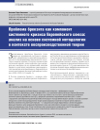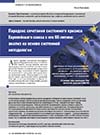Brexit Problem as a Component of the EU System Crisis: Analysis Based on Systemic Methodology in the Context of Reproduction Theory
DOI: 10.33917/es-3.169.2020.42-49
The article analyzes the Brexit problem, the solution of which has been delayed: four years passed from the referendum on Britain’s withdrawal from the European Union (February 16, 2016) till signing of the Brexit Act by Prime Minister Boris Johnson (January 31, 2020). The article’s novelty consists in assessing Brexit as a manifestation of the system crisis of the European Union (EU), officially recognized by the European authorities in 2015 due to violation of the development regularities of the European integration and the global crisis consequences. Based on systemic methodology in the aspect of reproduction theory, the internal and external causes of Brexit are analyzed. The author identifies a change in the US attitude to Brexit — from Barack Obama’s negative position to active support by Donald Trump in order to break down the European Union as a collective competitor composed of twenty-eight integrated countries. This is facilitated by the loss of economic sovereignty of the EU countries under US pressure. Possible British benefits and risks of losses as a result of exit from the EU are analyzed.





